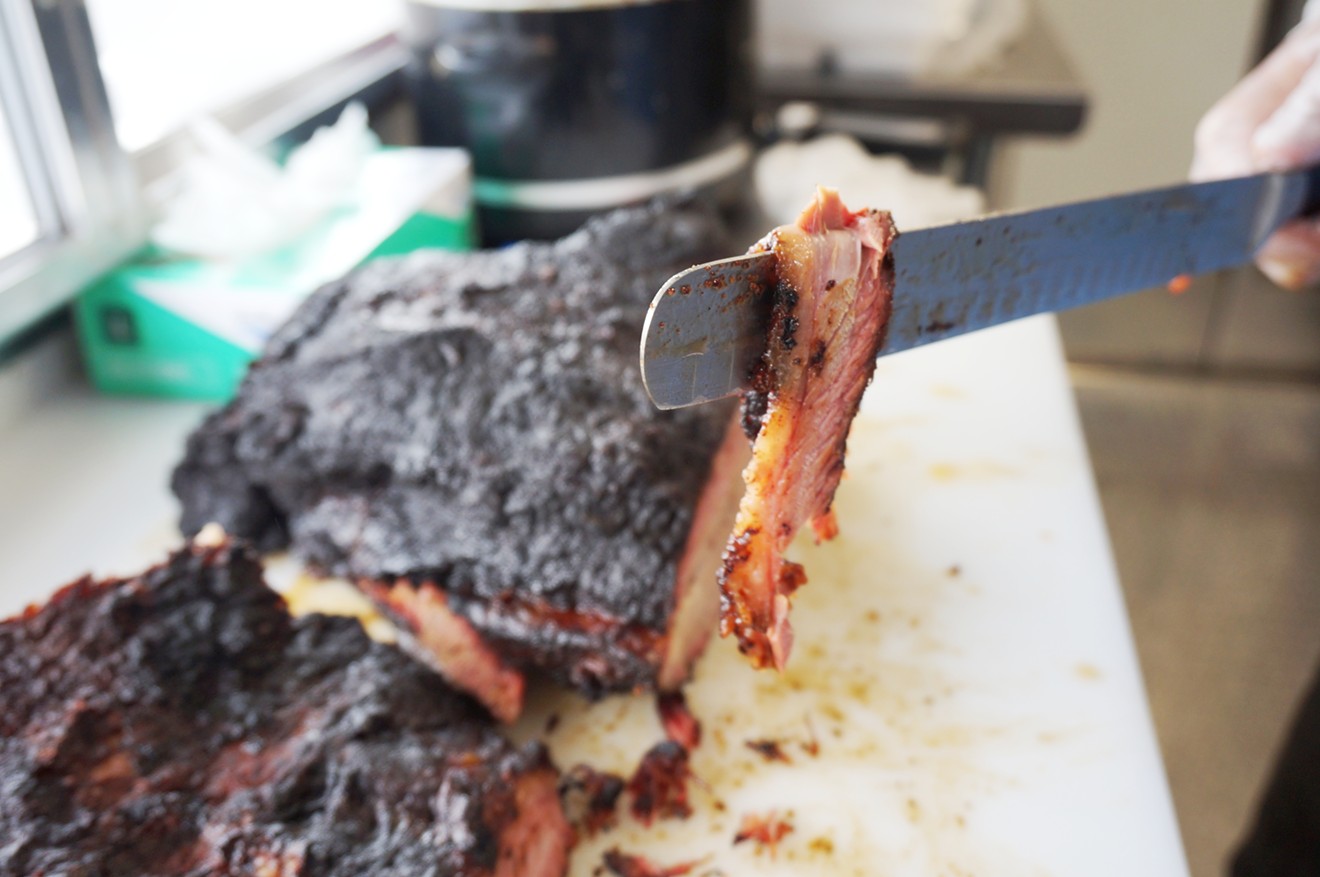James Diaz owns TRU Colotexmex Bar-B-Que & Catering, a semi-permanent trailer and outdoor smoker set up in the parking lot of Pyramid Liquors at 599 West Littleton Boulevard in Littleton. Diaz unveiled his trailer just a month ago, but he’s been catering for six years. He hails from Austin, where his family has lived for generations (back before Texas was admitted to the Union), and he calls his cooking Tex-Mex because it differs from the better-known Hill Country style developed by the German immigrants who ran butcher shops and smoked sausages and other cuts that didn’t sell over the counter. As kids, Diaz and his brother would get money for lunch at Whataburger from their mom. When they got sick of burgers, they’d hit the local HEB supermarket for meat to take home and cook over wood, so Diaz learned smoking at an early age. He honed his cooking skills at Serranos, a Tex-Mex restaurant in Austin that specializes in mesquite-grilled fajitas.

Tru Bar-B-Que owner James Diaz tends his smoker outside of a Littleton liquor store.
Mark Antonation
Diaz doesn’t skimp on the salt, so a dainty nibble on the bark might come across as a little over-salted, but a hearty bite of meat gives the appropriate ratio, and the amount of rub is definitely adjusted to fit the meat being smoked. Brisket gets a thicker coating than TRU’s more delicate pork loin, a cut that’s more common in Texas than Colorado. Diaz also smokes bone-in chicken thighs, St. Louis-cut pork ribs, sausage (right now he uses Polidori, but he hopes to soon start making his own) and beef tri-tip.
The brisket is the star, though: Diaz insists on using only Prime Angus, which accounts for only 2 percent of all beef sold in the United States. The finished product isn’t cheap — it’s $30 a pound or $17 for a platter with sides — but this is some of the best brisket you’ll find in town, and it’s unequaled for those who prefer bolder smoke and the rich, melty fat of the brisket point.
Other unique menu items at Diaz’s place are the Tex-Mex charro beans and TRU’s mesquite-grilled fajitas served on the flour tortillas he makes fresh daily. The fajitas aren’t always on the menu, so check the Facebook page (facebook.com/colotexmex) for daily updates.

J.J. Diaz hangs out at his dad's barbecue rig on West Littleton Boulevard.
Courtesy of TRU Bar-B-Que
On the opposite end of the metro area, Gustavo Aguilera-Torres and his wife, Kat, are serving up something entirely different at Gustavo’s BBQ Latin American Cuisine. A friend and fellow barbecue hunter first turned us on to Gustavo’s, describing it as “Mexican barbecue” and noting that the flavors had almost nothing in common with their counterparts from the American South, even if the words on the menu look familiar. She was right. As you walk in, the subtle aroma of smoke greets you, and the menu promises brisket, pork ribs, turkey legs, pulled pork, pulled chicken and lamb along with such comforting sides as potato salad and coleslaw. But the sandwiches are built on telera bread, and the sauces — roasted tomato, tomatillo and chipotle — would be perfectly at home atop tacos. Each meat carries a different seasoning, Aguilera-Torres explains, but they all have a distinct Mexican flair. The pulled pork, for example, is seasoned with a blend of seven chiles; it’s served juicy and tender but not mushy.

The pulled pork looks like traditional Southern barbecue but comes with Mexican flavors and sides.
Mark Antonation
The lamb at his family’s restaurant was wrapped in agave peel and cooked traditionally in a pit, but Gustavo’s uses a more modern smoker. The result is lightly smoked meats with deep chile flavors. The pork ribs, unlike Kansas City-style ribs with a chewy bark and dry texture, are moist and soft; the meat separates from the bone before you can even sink your teeth all the way in. “We’re not doing it like anyone else, and nobody else is doing what we do,” Aguilera-Torres promises.

These pork ribs in a seven-chile rub have a steamier finish than Southern-style ribs.
Mark Antonation
In the Deep South, great barbecue can be found in unlikely locations, from roadside stands to gas stations to underground alleyway restaurants. In Denver, you might have to drive a few miles and comb the strip malls and parking lots to locate great barbecue, but TRU and Gustavo’s are out there. Just follow the smoke.













